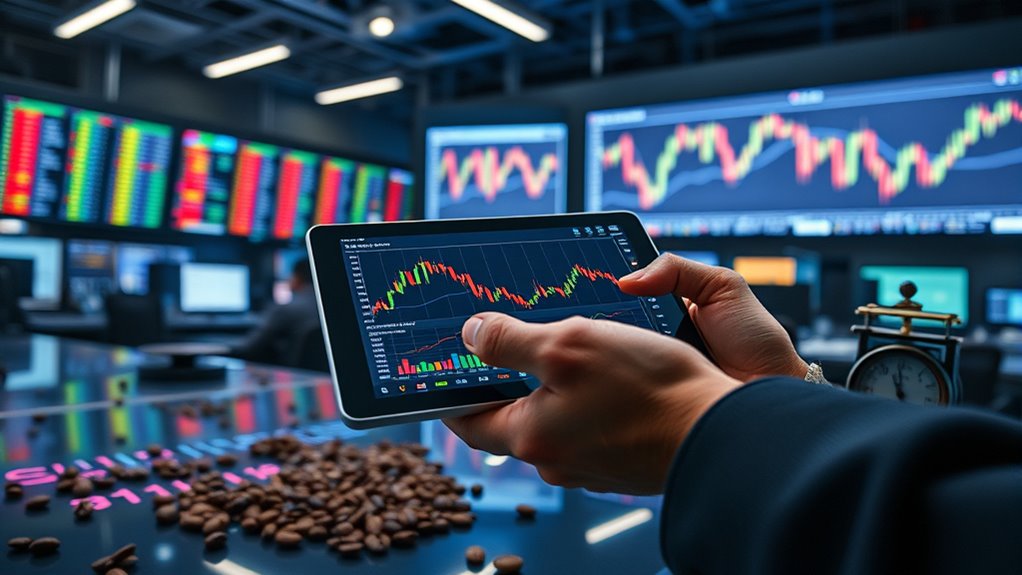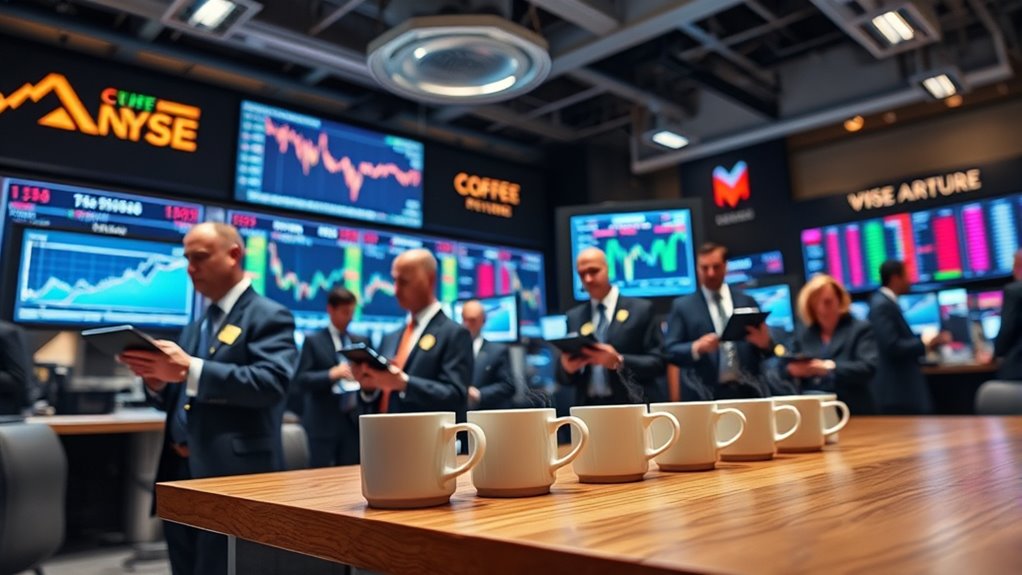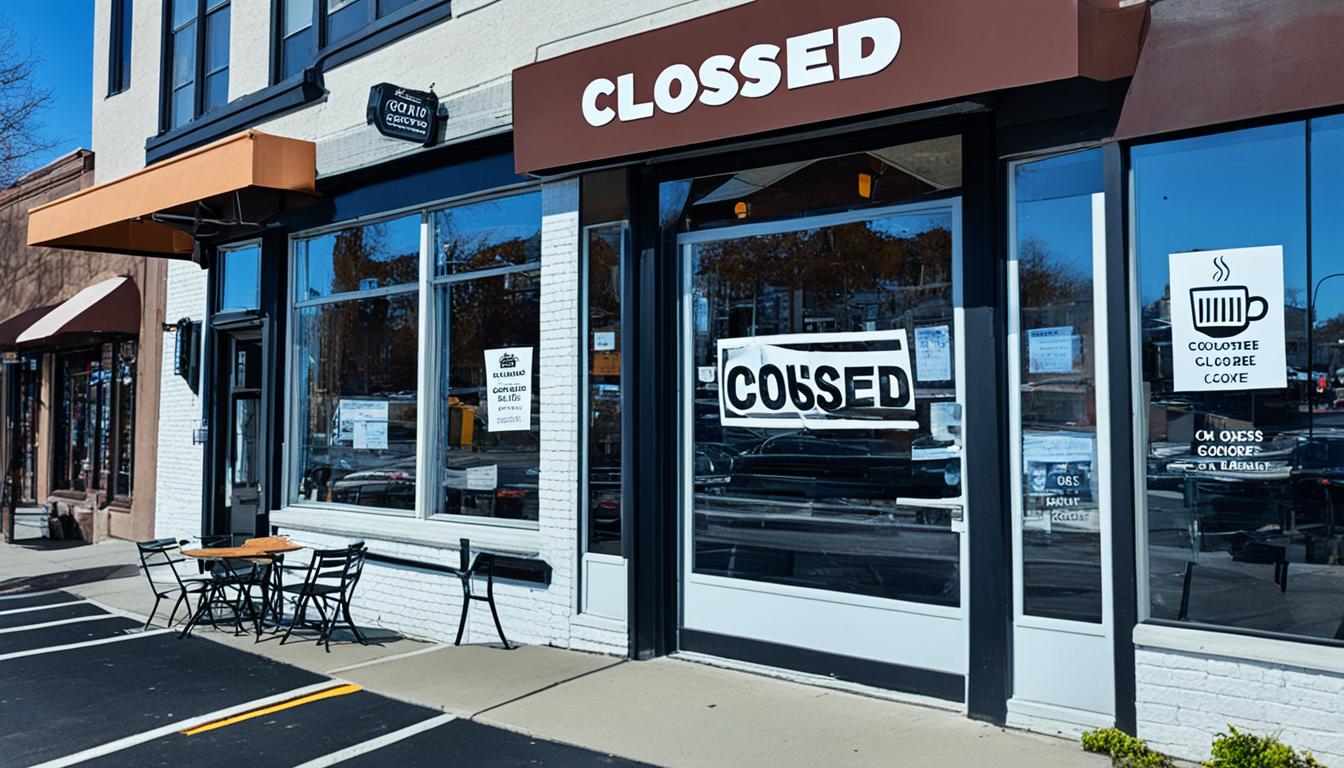To manage coffee price fluctuations, you can use futures contracts, which lock in prices for future delivery. Hedging with these contracts helps you reduce market risks, providing cost stability whether prices rise or fall. This strategy supports sustainable sourcing and long-term planning while promoting transparency. If you’re looking to understand how this all works together to keep supply steady and prices predictable, there’s more to uncover about how futures protect your interests.
Key Takeaways
- Coffee futures are contracts that lock in future delivery prices, helping manage price risks for producers, traders, and roasters.
- Hedging involves buying or selling futures to protect against unpredictable price fluctuations in the coffee market.
- Using futures stabilizes costs, enabling sustainable sourcing and long-term investments in environmentally friendly farming practices.
- Futures market transparency offers insights into supply-demand dynamics, aiding strategic decision-making and risk management.
- Engaging in futures trading promotes market efficiency, ethical sourcing, and cost predictability, supporting sustainable and responsible coffee production.

If you’re interested in how coffee prices fluctuate on the global market, understanding coffee futures is crucial. Coffee futures are contracts that lock in a price today for coffee delivered at a future date. They serve as an indispensable tool for producers, roasters, and traders to manage price risks and plan their operations. For coffee roasters, especially those committed to sustainable sourcing, these futures can help stabilize costs and ensure they can maintain their commitment to environmentally and socially responsible practices. By using futures contracts, roasters can protect themselves from sudden price swings that could threaten their ability to source beans ethically and sustainably.
When you’re involved in coffee roasting, knowing how futures work allows you to anticipate and hedge against market volatility. If coffee prices are expected to rise, you might purchase futures contracts now to secure a favorable rate for your upcoming roastings. This approach provides stability, giving you confidence to invest in quality and sustainable sourcing practices without the worry of unexpected cost increases. Conversely, if prices are projected to fall, you might sell futures contracts, locking in profits or minimizing losses. This strategic use of futures helps you plan your sourcing and roasting processes more effectively, aligning your supply chain with your sustainability goals.
Understanding coffee futures also involves recognizing their role in promoting sustainable sourcing. When producers and traders use futures to hedge against price fluctuations, they can better commit to long-term, sustainable cultivation. Stable prices mean farmers are more likely to invest in environmentally friendly farming techniques, such as shade-grown coffee or organic practices, because they have greater financial security. For roasters, futures contracts enable consistent sourcing of high-quality beans, supporting farmers who prioritize sustainable methods. This interconnectedness encourages a market where sustainability isn’t just a niche but a standard practice, driven by predictable prices and reduced market risk.
Additionally, futures trading fosters transparency and efficiency in the coffee market. By observing futures prices, you gain insights into market sentiment and supply-demand dynamics worldwide. This information can influence your decisions on when to buy or sell, ensuring you’re not caught off guard by sudden shifts. Moreover, awareness of high divorce rates and regional legal nuances can be analogous to understanding market volatility and legal frameworks that impact trading strategies. For those dedicated to ethical sourcing, futures can help align procurement strategies with sustainability commitments, avoiding rush orders or price hikes that might pressure farmers to cut corners or adopt less eco-friendly practices.
Frequently Asked Questions
How Do Weather Events Impact Coffee Futures Prices?
Weather events like climate variability and drought impacts directly affect coffee futures prices. When you see droughts or unpredictable weather, you should expect prices to rise because supply might decrease. These events cause uncertainty, leading traders to bid higher prices to secure future supplies. You can anticipate that negative weather patterns will increase price volatility, making it essential to monitor climate trends closely to manage your risks effectively.
What Role Do Government Policies Play in Coffee Price Fluctuations?
Government policies substantially influence coffee price fluctuations. When governments implement subsidies, they can lower production costs, leading to increased supply and potential price drops. Conversely, imposing trade tariffs makes importing coffee more expensive, reducing supply and raising prices. You should stay aware of these policies because they directly affect market stability and pricing, impacting your investments or trading strategies in coffee futures.
Can Small Farmers Effectively Hedge Their Coffee Sales?
Yes, small farmers can effectively hedge their coffee sales, but it’s like trying to catch a falling star! You need proper farmer financing and crop diversification strategies to succeed. By using futures contracts, you lock in prices, protecting yourself from wild price swings. Diversifying crops reduces dependency on coffee alone, giving you more control over income. With the right tools and knowledge, you can tame the volatile coffee market and secure your livelihood.
How Do Currency Exchange Rates Influence Coffee Futures?
Currency exchange rates greatly influence coffee futures because currency volatility can cause unpredictable price swings. When the exchange rate impacts your local currency, it affects the value of futures contracts, making them more or less profitable. You need to monitor exchange rate fluctuations closely because they can increase your price risk or create opportunities for hedging. Staying aware of the exchange rate impact helps you plan better and manage potential financial surprises in your coffee sales.
What Are the Main Risks Associated With Coffee Futures Trading?
You face main risks like market volatility and speculative trading. Market swings can cause unpredictable price changes, leading to potential losses if you don’t manage your positions carefully. Speculative trading increases risk because traders bet on price movements without underlying supply or demand changes, amplifying volatility. To protect yourself, it’s essential to stay informed, use stop-loss orders, and avoid over-leveraging, ensuring you’re better prepared for sudden market shifts.
Conclusion
By understanding coffee futures and hedging, you can better manage price risks and protect your investments. Did you know that over 80% of coffee traded globally is hedged using futures contracts? This shows how essential these tools are in stabilizing prices and ensuring market stability. So, whether you’re a producer or trader, mastering these strategies helps you navigate volatile markets more confidently and secure your financial future.









